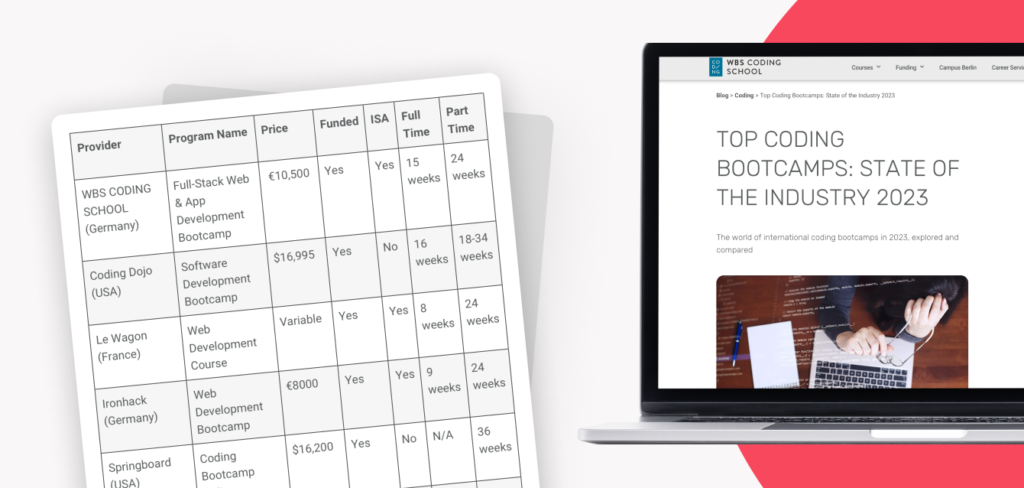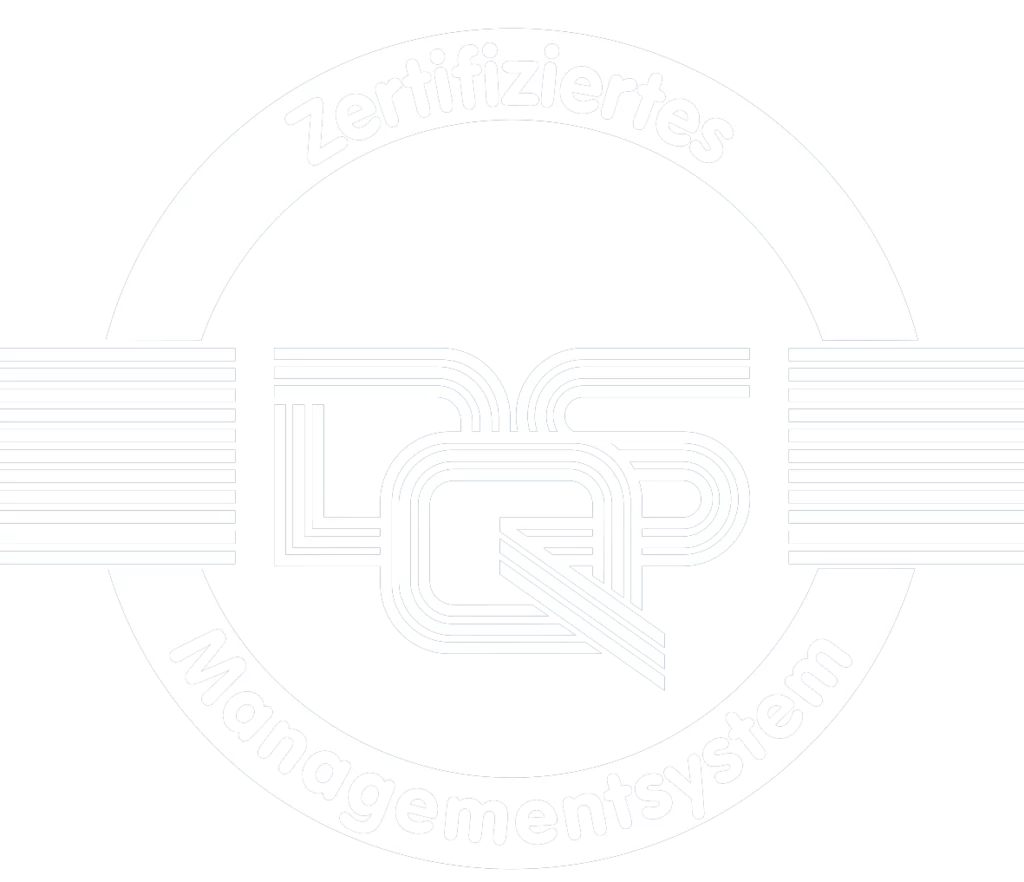A modern understanding of tech career paths would be incomplete if it did not include online training options for software developers. These options are increasingly varied and respond to very different needs, both personal and professional, which makes discerning between them sometimes difficult and confusing.
In this article we will explain which options exist to learn software development online, and relate them to your profile so that you can make an informed choice.
We will look at the best options for free software developer online courses, then at paid software developer online courses, and finally at coding bootcamps.
By the time you have finished reading, you will be in a position to choose the optimal path towards becoming a programmer – and to start following that path today.
CONTENTS
Which course is best to become a software developer?
Free software developer online training courses
Top software developer online training courses (paid options)
Top software developer online bootcamps
Software Developer Online Training FAQ
- What is a software developer and what do they do?
- Can a software developer be self-taught?
- Can you learn software development online?
- How fast can you become a software developer?
- What is the difference between frontend, backend and full-stack software development?
- Which tools must you learn for software development?

Which course is best to become a software developer?

There are three main learning paths towards learning professional software development, which can potentially overlap in places and even be combined:
- University
- Online courses
- Coding bootcamps
What is the difference between these, and which one is right for you?
University courses are typically the most thorough, as well as the longest learning programs and those that put the heaviest emphasis on theory. You’ll want this option if you’re looking to get a wide understanding of software development and its various branches, as well as the concepts and history that underlie it. There exist literally tens of thousands of university courses in software development, so we will not be looking at them in this article.
Online courses come in a wide variety of types, but most consist in prepared material with little or no support from instructors. If you don’t mind the idea of learning by yourself and you want to customise your learning journey as much as possible, these are a great option. In this article we will explore in detail which options exist – both free and paid – to take an online course in software development.
Coding bootcamps are intense training programs usually lasting a few months, typically focused on picking up practical skills and entering the world of work. They are distinct from online courses by the high levels of support you get while learning (from instructors, career services, community managers and other staff), as well as the fact that you will usually learn as part of a class. We have already explored all of the top coding bootcamps in our dedicated guide, but we will provide a summary of the information in that article here.
Free software developer online training courses
Top software developer online training courses (paid options)

Top software developer online bootcamps

Coding bootcamps exist both on-site and online, or as hybrids of both options. Compared to the online courses we listed above, they tend to be a lot more intensive, as you will be enrolled in a class and expected to show up every day. However, they also provide much greater levels of personal support, in the form of instructors, career services and other staff.
We have dealt with the topic of the top coding bootcamps of 2024 in our exhaustive guide, but for ease of reference, we will republish our rankings here. Please refer to the guide for more in-depth details.
The columns “Funded” and “ISA” refer to modes of payment made available by the bootcamp itself – see the next section of the article for a detailed explanation.
| Provider | Program Name | Price | Funded | ISA | Full Time | Part Time |
| WBS CODING SCHOOL (Germany) | Full-Stack Web & App Development Bootcamp | €10,500 | Yes | Yes | 15 weeks | 24 weeks |
| Coding Dojo (USA) | Software Development Bootcamp | $16,995 | Yes | No | 16 weeks | 18-34 weeks |
| Le Wagon (France) | Web Development Course | Variable | Yes | Yes | 8 weeks | 24 weeks |
| Ironhack (Germany) | Web Development Bootcamp | €8000 | Yes | Yes | 9 weeks | 24 weeks |
| Springboard (USA) | Coding Bootcamp Online | $16,200 | Yes | No | N/A | 36 weeks |
| Wild Code School (France) | Web Development Course | €6000 | Yes | Yes | 12 weeks | 20 weeks |
| Flatiron School (USA) | Software Engineering Bootcamp | $17,900 | Yes | No | 15 weeks | 40 weeks |
| Altcademy (USA) | Full-Stack Web Development | $1490 | No | No | N/A | 20-25 weeks |
| Spiced Academy (Germany) | Web Development Coding Bootcamp | €8500 | Yes | No | 12 weeks | N/A |
| General Assembly (USA) | Software Engineering Immersive | $15,950 | Yes | Yes | 12 weeks | 24 weeks |
| Primathon Academy (India) | Frontend Developer | ₹75,000 | No | Yes | 24 weeks | N/A |
| CareerFoundry (Germany) | Full-Stack Web Development Program | €8990 | No | Yes | 20 weeks | 40 weeks |
| upGrad (India) | Full Stack Development Bootcamp | ₹225,000 | Yes | No | N/A | 48 weeks |
SOFTWARE DEVELOPER ONLINE TRAINING FAQ

What is a software developer and what do they do?
A software developer creates and/or maintains the code that makes computer software work, either individually or (more often) as part of a team. This apparently simple definition belies the wide variety of software developer types that exist, from web & app developers through to data scientists.
Numerous other job titles linked to software development exist, such as software engineer, software architect and software analyst. These all have a relation with software development, but represent distinct branches of specialisation and involve different skills.
Can a software developer be self-taught?
Yes, it is possible to leverage learning material found in online courses, videos and books in order to learn software development entirely independently. However, while the available material is abundant, the topic is complex and consistently challenging.
Learning software development purely by yourself will require exceptional personal drive and discipline, and is typically the longest route to actually getting a job in the field, taking as it will several years in most cases before paid work is found.
Can you learn software development online?
Yes! As a matter of fact, a great deal of the resources available to learn software development, including many of the best courses and bootcamps, are available on a fully remote basis.
How fast can you become a software developer?
It can take as little as 3 months of intensive training in a coding bootcamp to 1-3 years of independent or university study. Bear in mind that the path into professional software development varies tremendously depending on both the specialisation and the learning paths that are chosen.
That said, software development is a field a little bit like music: reaching a level of proficiency sufficient to start performing it does not at all mean that one no longer has anything to learn, because the field is so extraordinarily deep and expansive. Indeed, mastery of software development as such is a bit of a chimera: while the better you get at it, the more valuable you will be as a professional, you will never reach a point where you can no longer get better, nor should you expect to.
What is the difference between frontend, backend and full-stack software development?
Frontend, backend and full-stack software development are distinctions especially prominent in the field web and app development, that is to say, the creation of web pages and mobile apps. However, these terms also apply to other kinds of software development as well. A Windows user program, or a videogame, will also have a frontend and a backend, for example.
Frontend development refers to the creation of those parts of a program that a user can interact with, or at least which they can see or hear, such as buttons on a page or animated effects. Backend refers to the data, the logic and the information around which the frontend is built. So, for example, a mobile app that displays live sports results will have a frontend displaying the results, and a backend collecting those results and feeding it to the frontend.
Full-stack development represents the combination of frontend and backend, and a full-stack developer will be one who is proficient in both of those fields.
Which tools must you learn for software development?
The question of which tools one should learn for software development does not have a simple answer and depends entirely on the type of software developer one wants to become. Speaking broadly, one can say that you should start by learning one general purpose programming language, ideally one that is highly popular in the tech world, and then complement that with other tools related to the subject you are studying.
Thus, a good starting point may be to learn a language like Python, C++ or Java. Then, someone who wishes to specialise in data science may want to pick up tools like SQL and Tableau, while an aspiring game developer may want to become proficient with a game engine like Unity.
These are not universal rules, however, and depending on the specialisation you may want to take a different approach. Someone looking to get into web development, for example, would do well to study HTML, CSS and JavaScript. Of these, only JavaScript could be described as a general purpose programming language, and even then the definition would be a bit contentious (it’s certainly not as flexible as Python, for example).






